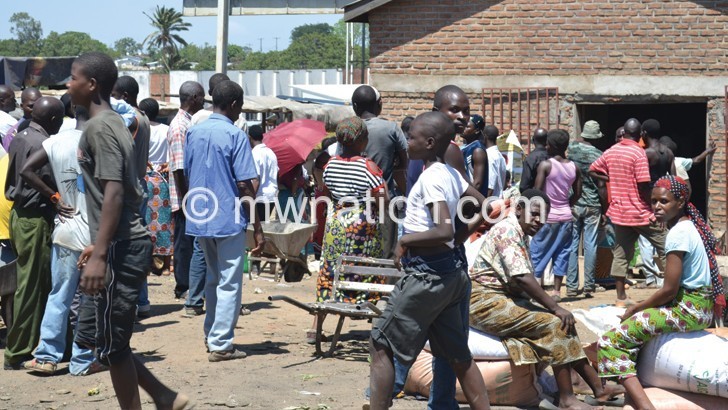Fisp farmers ripped off
Fisp commercial suppliers are ripping off poor farmers by charging them opportunistic price surcharges of between K700 and K1 000 per bag of fertiliser they buy.
A study conducted by the Centre for Development Management (CDM) and the Farmers Union of Malawi (FUM) with support from UKAid in 2016/17 fiscal year observed that commercial Farm Input Subsidy Programme (Fisp) suppliers were benefitting from Fisp supplies through over-pricing.

The study noted that most commercial suppliers were adjusting fertiliser prices by K1 000 and K700 per bag of NPK and Urea above prices of Agricultural Development and Marketing Corporation (Admarc) and Smallholder Farmers Fertiliser Revolving Fund of Malawi (SFFRFM).
This reporter found that prior to the 2018/19 Fisp season, most private sector farm inputs suppliers sold NPK and Urea fertilisers at K21 800 and K19 500, respectively, but they increased the prices by between K1 000 and K500 per bag at the start of the Fisp season.

Some small-scale farmers, who were registered beneficiaries of Fisp last year, confirmed in random interviews in Lilongwe, Dedza, Mzimba, Mwanza and Neno, last week, about the price adjustment on fertiliser.
However, others were not aware of the price adjustments.
“The fertiliser we bought under Fisp was priced differently to that sold at commercial rate. For example, a bag that costs K21 800 from commercial suppliers attracted K22 800 gross price under Fisp. We were paying K7 800 [instead of K6 800] for a bag of fertiliser,” said Mzimba-based Agnes Chirwa, sounding grateful for the programme, unaware of the imbedded surcharge.
In Neno, a 2018/2019 Fisp beneficiary Enock Neti of Zalewa Village in Traditional Authority (T/A) Symon also confirmed that some suppliers of the farm inputs had increased fertiliser prices by the same margins.
“I bought NPK and Urea fertiliser at a higher cost by a margin of K1 000 and K700, respectively. I had no option because supply at Admarc and SFFRFM outlets where prices were lower, was intermittent,” said Neti in an interview on Thursday.
Private traders were allocated 90 percent of Fisp supplies in the 2018/19 season. Admarc and SFFRFM, which sold at Government set prices, took the remaining 10 percent, according to the 2018/19 report issued by the Logistics Unit in the Ministry of Agriculture.
In the 2019/20 National Budget, the two institutions have been allocated the same tonnage, according to Minister of Finance, Economic Development and Planning Joseph Mwanamvekha.
Forty-eight private sector suppliers were engaged to supply fertiliser and seed in the 2018/19 season, according to a statement by the Principal Secretary for Agriculture, Grey Nyandule-Phiri. The statement also said there was an additional 100 000 beneficiaries to the initial 1.5 million figure.
In the 2019/20 National Budget, Fisp has been allocated K35.5 billion, down from K40 billion last year, to benefit 900 000 ultra-poor people. Out of 600 000 people fewer than last season’s beneficiaries. Of the total funding, K27 billion will go towards purchase of fertiliser, K5.4 billion for seed vouchers while K2.2 billion is for legumes. K850 million will cater for administrative costs and other overheads based on previous estimates.
In 2016/2017 fiscal year, government increased fertiliser tonnage allocated for direct private sector retailing to beneficiaries to 60 percent while in 2018/19 financial year reached 90 percent, according to official reports we have seen.
In an interview last Friday, agriculture expert Tamani Nkhono-Mvula observed that poor farmers should be given some form of protection, arguing that the purpose of the subsidy programme will be defeated if the intended beneficiaries become secondary beneficiaries with commercial entities appropriating substantial benefits.
“Government liberalised the fertiliser market to incentivise suppliers to reach the last mile beneficiaries while being able to recover the involved high costs of financing, transportation, storage and other overhead costs. But this should not present inequities, especially for those in far-flung areas,” he observed.
Fisp is a government policy meant to help poor farmers afford fertiliser and other farm inputs. But Nyandule-Phiri said in an interview on Wednesday that the policy stand on farm input pricing is to let market forces dictate prices.
He said: “The powers of demand and supply in the market are always at play. Government just makes sure that it pays K15 000 for every bag that beneficiaries buy.”
This means that Fisp beneficiaries are at the mercy of commercial traders who decide how much to surcharge per bag of fertiliser.
Under Fisp, beneficiaries are given coupons worth K15 000 for two bags of fertiliser each, a maize seed voucher with a redemption value of K5 000 and a legume voucher worth K2 500 which can be used to access beans, cow pea, groundnut or soybean seed.
Farmers pay the difference between the coupon value and the market price which varies depending on supplier, geographical location and demand and supply.
Mwanamvekha recently announced that government had set aside K35.5 billion for 900 000 resource poor Malawians in this year’s Fisp down from K40 billion last year which targeted 1 500 beneficiaries.





